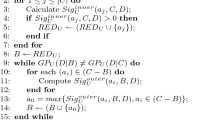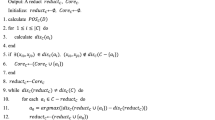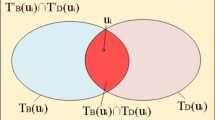Abstract
Attribute reduction is an important application of rough set theory. With the dynamic changes of data becoming more and more common, traditional attribute reduction, also called static attribute reduction, is no longer efficient. How to update attribute reducts efficiently gets more and more attention. In the light of the variation about the number of objects, we focus on incremental attribute reduction approaches based on knowledge granularity which can be used to measure the uncertainty in incomplete decision systems. We first introduce incremental mechanisms to calculate knowledge granularity for incomplete decision systems when multiple objects vary dynamically. Then, incremental attribute reduction algorithms for incomplete decision systems when adding multiple objects and when deleting multiple objects are proposed respectively. Finally, comparative experiments on different real-life data sets are conducted to demonstrate the effectiveness and efficiency of the proposed incremental algorithms for updating attribute reducts with the variation of multiple objects in incomplete decision systems.


Similar content being viewed by others
Explore related subjects
Discover the latest articles, news and stories from top researchers in related subjects.References
Pawlak Z (1991) Rough sets: theoretical aspect of reasoning about data. Kluwer Academic Publishers, Dordrecht
Wang R, Wang X, Kwong S, Xu C (2017) Incorporating diversity and informativeness in multiple-instance active learning. IEEE Trans Fuzzy Syst 25(6):1460–1475
Wang X, Tsang ECC, Zhao S, Chen D, Yeung DS (2007) Learning fuzzy rules from fuzzy samples based on rough set technique. Inf Sci 177(20):4493–4514
Wang X, Xing H, Li Y, Hua Q, Dong C, Pedrycz W (2015) A study on relationship between generalization abilities and fuzziness of base classifiers in ensemble learning. IEEE Trans Fuzzy Syst 23(5):1638–1654
Dai J, Tian H, Wang W, Liu L (2013) Decision rule mining using classification consistency rate. Knowl-Based Syst 43:95–102
Zhao B, Ren Y, Gao D (2019) Prediction of service life of large centrifugal compressor remanufactured impeller based on clustering rough set and fuzzy bandelet neural network. Appl Soft Comput 78:132–140
Hao C, Li J, Fan M, Liu W, Tsang ECC (2017) Optimal scale selection in dynamic multi-scale decision tables based on sequential three-way decisions. Inf Sci 415:213–232
Liang D, Xu Z, Liu D (2017) Three-way decisions based on decision-theoretic rough sets with dual hesitant fuzzy information. Inf Sci 396:127–143
Wang X, Zhai J, Lu S (2008) Induction of multiple fuzzy decision trees based on rough set technique. Inf Sci 178(16):3188–3202
Liu X, Qian Y, Liang J (2014) A rule-extraction framework under multigranulation rough sets. Int J Mach Learn Cybern 5(2):319–326
Zhang X, Mei C, Chen D, Li J (2014) Multi-confidence rule acquisition and confidence-preserved attribute reduction in interval-valued decision systems. Int J Approx Reason 55(8):1787–1804
Cheruku R, Edla DR, Kuppili V, Dharavath R (2018) RST-BatMiner: a fuzzy rule miner integrating rough set feature selection and bat optimization for detection of diabetes disease. Appl Soft Comput 67:764–780
Hamouda SKM, Wahed ME, Alez RHA, Riad K (2018) Robust breast cancer prediction system based on rough set theory at National Cancer Institute of Egypt. Comput Methods Programs Biomed 153:259–268
Jothi G, Inbarani HH (2016) Hybrid tolerance rough set-firefly based supervised feature selection for MRI brain tumor image classification. Appl Soft Comput 46:639–651
Dai J, Xu Q (2013) Attribute selection based on information gain ratio in fuzzy rough set theory with application to tumor classification. Appl Soft Comput 13(1):211–221
Sun L, Zhang X, Qian Y, Xu J, Zhang S, Tian Y (2019) Joint neighborhood entropy-based gene selection method with fisher score for tumor classification. Appl Intell 49(4):1245–1259
Dai J, Wang W, Xu Q, Tian H (2012) Uncertainty measurement for interval-valued decision systems based on extended conditional entropy. Knowl Based Syst 27:443–450
Dai J, Wang W, Mi J (2013) Uncertainty measurement for interval-valued information systems. Inf Sci 251:63–78
Dai J, Hu H, Hu Q, Huang W, Zheng N, Liu L (2018) Locally linear approximation approach for incomplete data. IEEE Trans Cybern 48(6):1720–1732
Wang C, Huang Y, Shao M, Chen D (2019) Uncertainty measures for general fuzzy relations. Fuzzy Sets Syst 360:82–96
Dai J, Wei B, Zhang X, Zhang Q (2017b) Uncertainty measurement for incomplete interval-valued information systems based on \(\alpha\)-weak similarity. Knowl Based Syst 136:159–171
Ko YC, Fujita H, Li T (2017) An evidential analysis of Altman Z-score for financial predictions: case study on solar energy companies. Appl Soft Comput 52:748–759
Lei L (2018) Wavelet neural network prediction method of stock price trend based on rough set attribute reduction. Appl Soft Comput 62:923–932
Singh AK, Baranwal N, Nandi GC (2019) A rough set based reasoning approach for criminal identification. Int J Mach Learn Cybern 10(3):413–431
Wang X, Wang R, Xu C (2018b) Discovering the relationship between generalization and uncertainty by incorporating complexity of classification. IEEE Trans Cybern 48(2):703–715
Fan J, Jiang Y, Liu Y (2017) Quick attribute reduction with generalized indiscernibility models. Inf Sci 397:15–36
Ni P, Zhao S, Wang X, Chen H, Li C (2019) PARA: a positive-region based attribute reduction accelerator. Inf Sci 503:533–550
Dai J, Tian H (2013) Fuzzy rough set model for set-valued data. Fuzzy Sets Syst 229:54–68
Dai J (2013) Rough set approach to incomplete numerical data. Inf Sci 240:43–57
Konecny J, Krajca P (2018) On attribute reduction in concept lattices: experimental evaluation shows discernibility matrix based methods inefficient. Inf Sci 467:431–445
Wang C, He Q, Shao M, Hu Q (2018a) Feature selection based on maximal neighborhood discernibility. Int J Mach Learn Cybern 9(11):1929–1940
Dai J, Hu Q, Zhang J, Hu H, Zheng N (2017) Attribute selection for partially labeled categorical data by rough set approach. IEEE Trans Cybern 47(9):2460–2471
Dai J, Tian H (2013) Entropy measures and granularity measures for set-valued information systems. Inf Sci 240(11):72–82
Wang F, Liang J, Dang C (2013) Attribute reduction for dynamic data sets. Appl Soft Comput 13(1):676–689
Bhattacharya A, Goswami RT, Mukherjee K (2019) A feature selection technique based on rough set and improvised PSO algorithm (PSORS-FS) for permission based detection of android malwares. Int J Mach Learn Cybern 10(7):1893–1907
Dai J, Hu Q, Hu H, Huang D (2018a) Neighbor inconsistent pair selection for attribute reduction by rough set approach. IEEE Trans Fuzzy Syst 26:937–950
Dai J, Hu H, Wu WZ, Qian Y, Huang D (2018) Maximal discernibility pairs based approach to attribute reduction in fuzzy rough sets. IEEE Trans Fuzzy Syst 26(4):2174–2187
Li F, Jin C, Yang J (2019) Roughness measure based on description ability for attribute reduction in information system. Int J Mach Learn Cybern 10(5):925–934
Liu K, Yang X, Yu H, Mi J, Wang P, Chen X (2019) Rough set based semi-supervised feature selection via ensemble selector. Knowl Based Syst 165:282–296
Wang C, Huang Y, Shao M, Fan X (2019) Fuzzy rough set-based attribute reduction using distance measures. Knowl Based Syst 164:205–212
Dai J, Han H, Hu Q, Liu M (2016) Discrete particle swarm optimization approach for cost sensitive attribute reduction. Knowl Based Syst 102:116–126
Li Y, Jin Y, Sun X (2018) Incremental method of updating approximations in DRSA under variations of multiple objects. Int J Mach Learn Cybern 9(2):295–308
Liang J, Wang F, Dang C, Qian Y (2014) A group incremental approach to feature selection applying rough set technique. IEEE Trans Knowl Data Eng 26(2):294–308
Ma F, Ding M, Zhang T (2019) Compressed binary discernibility matrix based incremental attribute reduction algorithm for group dynamic data. Neurocomputing 294:20–27
Wei W, Song P, Liang J, Wu X (2019) Accelerating incremental attribute reduction algorithm by compacting a decision table. Int J Mach Learn Cybern 10(9):2355–2373
Yang Y, Chen D, Wang H (2017) Active sample selection based incremental algorithm for attribute reduction with rough sets. IEEE Trans Fuzzy Syst 25(4):825–838
Yang Y, Chen D, Wang H (2018) Incremental perspective for feature selection based on fuzzy rough sets. IEEE Trans Fuzzy Syst 26(3):1257–1273
Jing Y, Li T, Huang J, Zhang Y (2016a) An incremental attribute reduction approach based on knowledge granularity under the attribute generalization. Int J Approx Reason 76:80–95
Jing Y, Li T, Huang J, Chen H, Horng SJ (2017) A group incremental reduction algorithm with varying data values. Int J Intell Syst 32(9):900–925
Wei W, Wu X, Liang J, Cui J, Sun Y (2018) Discernibility matrix based incremental attribute reduction for dynamic data. Knowl Based Syst 140:142–157
Jing Y, Li T, Fujita H, Wang B, Cheng N (2018) An incremental attribute reduction method for dynamic data mining. Inf Sci 465:202–218
Yang C, Ge H, Li L, Ding J (2019) A unified incremental reduction with the variations of the object for decision tables. Soft Comput 23(15):6407–6427
Shu W, Shen H (2014a) Incremental feature selection based on rough set in dynamic incomplete data. Pattern Recogn 47(12):3890–3906
Shu W, Shen H (2014b) Updating attribute reduction in incomplete decision systems with the variation of attribute set. Int J Approx Reason 55(3):867–884
Xie X, Qin X (2018) A novel incremental attribute reduction approach for dynamic incomplete decision systems. Int J Approx Reason 93:443–462
Luo C, Li T, Yao Y (2017) Dynamic probabilistic rough sets with incomplete data. Inf Sci 417:39–54
Zhang C, Dai J (2019) An incremental attribute reduction approach based on knowledge granularity for incomplete decision systems. Granul Comput. https://doi.org/10.1007/s41066-019-00173-7
Kryszkiewicz M (1998) Rough set approach to incomplete information systems. Inf Sci 112(1):39–49
Jing Y, Li T, Luo C, Horng SJ, Wang G, Yu Z (2016b) An incremental approach for attribute reduction based on knowledge granularity. Knowl Based Syst 104:24–38
Acknowledgements
This work was partially supported by the National Natural Science Foundation of China (Nos. 61976089, 61473259, 61070074, and 60703038), and the Hunan Provincial Science and Technology Project Foundation (2018TP1018, 2018RS3065).
Author information
Authors and Affiliations
Corresponding author
Additional information
Publisher's Note
Springer Nature remains neutral with regard to jurisdictional claims in published maps and institutional affiliations.
Rights and permissions
About this article
Cite this article
Zhang, C., Dai, J. & Chen, J. Knowledge granularity based incremental attribute reduction for incomplete decision systems. Int. J. Mach. Learn. & Cyber. 11, 1141–1157 (2020). https://doi.org/10.1007/s13042-020-01089-4
Received:
Accepted:
Published:
Issue Date:
DOI: https://doi.org/10.1007/s13042-020-01089-4




